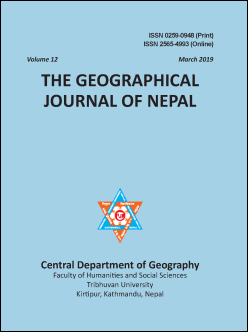Institutions and rural economy in Rolpa district of Nepal
DOI:
https://doi.org/10.3126/gjn.v12i1.23420Keywords:
local institution, rural livelihood, enterprise development, social mobilizationAbstract
This paper aims to analyze a pertinent academic debate pragmatically whether institutions assist in promoting life standard and betterment of the common people or they act just as an instrument to perpetuate poverty and fulfill the interest of vested group. To accomplish this task, Marxist, Post-Marxist theories are taken into consideration in order to indicate how an institution or the process of institutionalization as such is debated and perceived in social science academia. Likewise, the research also uses the popular research methodology of pragmatism which focuses on data collection, analysis and field study. The research is conducted in Sunil Smirti Gaupalika (Rural Municipality) of Rolpa district and focuses on the role of institutions in order to transform particularly the economic life of the people. The research divides institutions into two parts. The first one includes the governmental local institution Gaupalika. The second part includes INGO/NGOs. This division enables to decipher and historicize what these government and non government institutions have done independently and collectively to uplift the life of target group. The research finds that INGO/NGOs and locals institution in the remote village like Sunil Smirti Gaupalika have played significant roles on uniting the economically poor and make individual and collective efforts to fight against poverty. They work to find out the poor and economically weak section of the society by setting target group, generating the awareness and providing conductive environment for putting collective effort in their fight against poverty to a certain extent. Therefore, these two types of institutions have been found tremendously supportive in uniting what Marx calls “have-nots” of Sunil Smirti Gaupalika. However, the research also finds that mostly Brahmin/Chhetri communities have been benefitted by these programs. In comparison the ratio of economic growth between Brahmin-Chhetri community and Janjati community-Dalit community, the first one is found to be accelerating whereas the second one is slower and sluggish.
Downloads
Downloads
Published
How to Cite
Issue
Section
License
© Authors




